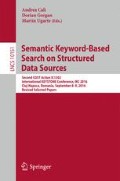Abstract
CrossCult is a newly started project that aims to make reflective history a reality in the European cultural context. In this paper we examine how the project aims to take advantage of advances in semantic technologies in order to achieve its goals. Specifically, we see what the quest for reflection is and, through practical examples from two of the project’s flagship pilots, explain how semantics can assist in this direction.
Access this chapter
Tax calculation will be finalised at checkout
Purchases are for personal use only
References
Licciardi, G., Amirtahmasebi, R. (eds.): The Economics of Uniqueness: Investing in Historic City Cores and Cultural Heritage Assets for Sustainable Development, Washington DC, World Bank (2012)
Greffe, X.: La valorisation économique du patrimoine. La documentation française, Paris (2004)
Dümcke, C., Gnedovsky, M.: The Social and Economic Value of Cultural Heritage: Literature Review (2013)
Bartlett, A., Kelly, L.: Youth audiences: Research summary, Australian Museum Audience Research Centre (2000)
Lepouras, G., Vassilakis, C.: Virtual museums for all: employing game technology for edutainment. Virtual Reality 8(2), 96–106 (2004)
Bikakis, A.: CROSSCULT: empowering reuse of digital cultural heritage in context-aware crosscuts of European history, ESWC 2016 Project Networking session, 29th May–2nd June 2016, Heraklion, Crete, Greece (2016)
Lykourentzou, I., Naudet, Y., Jones, C., Sillaume, G.: Fostering a multi-faceted view of European history: the CROSSCULT project. In: DHBenelux 2016 conference, 9–10 June, Luxembourgh (2016)
Treaty of Lisbon amending the Treaty on European Union and the Treaty establishing the European Community (2007)
EGMUS European Group on Museum Statistics. http://www.egmus.eu/
CrossCult project website. http://www.crosscult.eu/
Acknowledgments
The CrossCult project has received funding from the European Union’s Horizon 2020 research and innovation programme. This work has been partially supported by COST Action IC1302: Semantic keyword-based search on structured data sources (KEYSTONE).
Author information
Authors and Affiliations
Corresponding author
Editor information
Editors and Affiliations
Rights and permissions
Copyright information
© 2017 Springer International Publishing AG
About this paper
Cite this paper
Bampatzia, S. et al. (2017). The Use of Semantics in the CrossCult H2020 Project. In: Calì, A., Gorgan, D., Ugarte, M. (eds) Semantic Keyword-Based Search on Structured Data Sources. IKC 2016. Lecture Notes in Computer Science(), vol 10151. Springer, Cham. https://doi.org/10.1007/978-3-319-53640-8_17
Download citation
DOI: https://doi.org/10.1007/978-3-319-53640-8_17
Published:
Publisher Name: Springer, Cham
Print ISBN: 978-3-319-53639-2
Online ISBN: 978-3-319-53640-8
eBook Packages: Computer ScienceComputer Science (R0)

